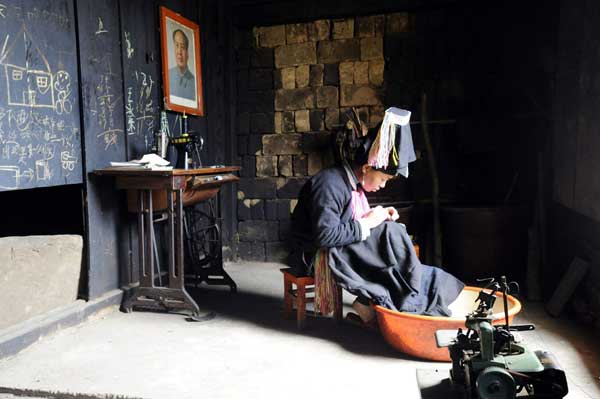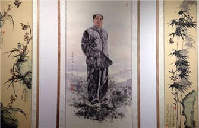Mao's legacy lives on
 |
|
A woman of the Yao ethnic group does needlework at home in Yaozhai village in Yuanyang county, Yunnan province, with a Mao portrait on the wall. |
Mao's timeless appeal
Three decades into China's reform and opening-up drive, Man'en, along with many other remote villages, has witnessed drastic economic and social transformation.
Satellite television broadcasts, mobile phones, motorcycles, cars, highways and the Internet have shortened the distance between the village and the outside world. And yet Mao has remained on a pedestal in the hamlet of more than 6,000 villagers.
A Mao portrait bought in Beijing is regarded as a very precious souvenir for local villagers, while Mao's mausoleum is a must-see on their first trip to the national capital, says Ai Pa, who is also chief of Man'en village.
Like Ai Pa and his fellow villagers, the ethnic Blang people in Jiliang, another village with a population of more than 2,000 in Menghai, also celebrate Mao. They print his image on glazed bricks on the outside walls of their new homes.
These ethnic minority hamlets are not isolated cases. A survey by the Horizon Research Consultancy Group in 2008 in 40 Chinese cities and towns, including Beijing, Shanghai and Guangzhou, showed that 11.2 percent of respondents enshrine Mao Zedong at home, a higher number than those who worship Buddha, the god of wealth, and other gods.
Huang Jisu, sociologist, playwright and cultural critic, says Mao worship is a complicated phenomenon strongly linked to social background and personal experiences.
However, Huang doesn't believe there is a geographical, age or social class division in regard to people's attitude toward Mao.
Huang says, there are also Mao fans in big cities like Beijing and Shanghai, while some young people in universities also admire him. Huang also notes that it is not unusual for entrepreneurs and millionaires to admire Mao.
However, Huang stresses that admiration for Mao does not necessarily mean the admirers want to go back to the Mao era.
"It's quite natural for Mao, such a great man, to have admirers. Just as pop stars can have so many fans, why not Mao?" says 58-year-old Huang, a researcher with the Chinese Academy of Social Sciences in Beijing.
Ordinary people psychologically need a great person to hold in high esteem, Huang says, and Mao has filled - and continues to fill - that need.
In Huang's view, the greatest good that Mao did for the nation was lead the Chinese revolution, which ended the nation's survival crisis that had lasted a century.
Both Sun Yat-sen and Chiang Kai-shek failed to lead the nation out of that crisis, and Mao was an unrivaled great man of his century, Huang says.




















